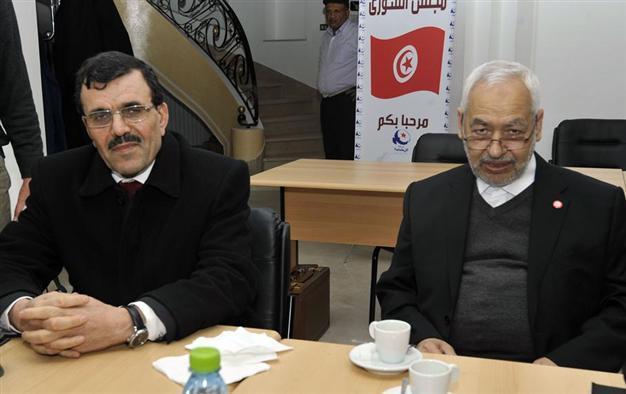Tunisia president appoints Larayedh to form government
TUNIS - Agence France-Presse

Interior Minister Ali Larayedh and Ennahda ruling party's leader Rached Ghannouchi pose before a meeting at the party's headquarters on February 22, 2013 in Tunis. Ennahda has tapped Larayedh as its candidate to replace Prime Minister Hamadi Jebali, who resigned this week amid a major political crisis, the party said. AFP PHOTO / FETHI BELAID
Tunisian President Moncef Marzouki tasked Interior Minister Ali Larayedh on Friday with forming a new government after Prime Minister Hamadi Jebali resigned amid a major political crisis.
Marzouki "wished Larayedh success and will hand him this evening the letter officially appointing him" as Jebali's successor, his spokesman Adnene Mancer said.
Larayedh "will have 15 days to form a new government and present its plan" to the head of state," Mancer said, adding that Marzouki urged him to do so "as quickly as possible because the country cannot wait any longer." The ruling Islamist party Ennahda had put forward the name of Larayedh, 57, after its Shura Council selected him overnight.
Ennahda, which was already leading a coalition, has promised to build as broadly based a government as possible. And with its 89 MPs, it should have no difficulty getting the 109 votes needed for a majority.
Larayedh, who was imprisoned and tortured under the regime of Zine El Abidine Ben Ali, has been interior minister since the dictator was ousted in 2011.
A moderate member of the party, he is seen as a man of dialogue.
Earlier on Friday, Radio Mosaique FM and Shems-FM, as well as an Ennahda source, said Larayedh had been chosen overnight by the party's Shura Council.
The other prospective candidates were said to have been Agriculture Minister Mohamed Ben Salem, Justice Minister Noureddine Bhiri and Health Minister Abdellatif Mekki.
Jebali resigned on Tuesday after his plan to form a non-partisan government, announced in the wake of public outrage over the murder of leftist politician and government critic Chokri Belaid, was rejected by Ennahda, his own party.
The assassination plunged Tunisia into its worst political crisis since Ben Ali's ouster, enflaming political tensions and laying bare Ennahda's divisions between moderates and hardliners.
Coincidentally, it was Larayedh who told reporters there had been arrests in the murder inquiry, though he did not say how many.
"The investigation has not led yet to identify the killer, those behind the murder and its motives," he said.
Belaid's shooting death, outside his home, did little to ease the political misgivings of liberals and secularists, who believe Ennahda is failing to rein in religious extremists threatening stability.
Belaid's family accused Ennahda of orchestrating his murder, a charge it strongly denied.
The killing also sparked deadly street protests and strikes, which Jebali attempted to defuse by announcing plans for a non-partisan cabinet of technocrats to lead Tunisia into early elections.
In a televised farewell speech on Thursday night, Jebali repeated that his proposal was the best way forward, while reaffirming his decision not to accept a new appointment with "no prospect for success".
He spread wide the blame for its failure, accusing not only coalition and opposition parties, but also the unions, business community and the media, which he said never stopped "throwing fuel on the fire".
Tunisia is deadlocked over the drafting of a constitution, with parliament divided over the nature of the country's future political system 15 months after it was elected and more than two years after the revolution.
Jebali's plans, while largely supported by the opposition, had been bitterly opposed by Ennahda hardliners, represented by Ghannouchi, who refused to give up key portfolios and who insist on Ennahda's electoral legitimacy.
Since the revolution, Tunisia has also been rocked by violence blamed on radical Salafists, and ongoing social unrest over the government's failure to improve poor living conditions.
On Thursday, medics said two policemen were wounded in a firefight with presumed Salafists they had cornered in a mosque in Sidi Bouzid, cradle of the uprising that ousted Ben Ali. An official said only one was hurt.
